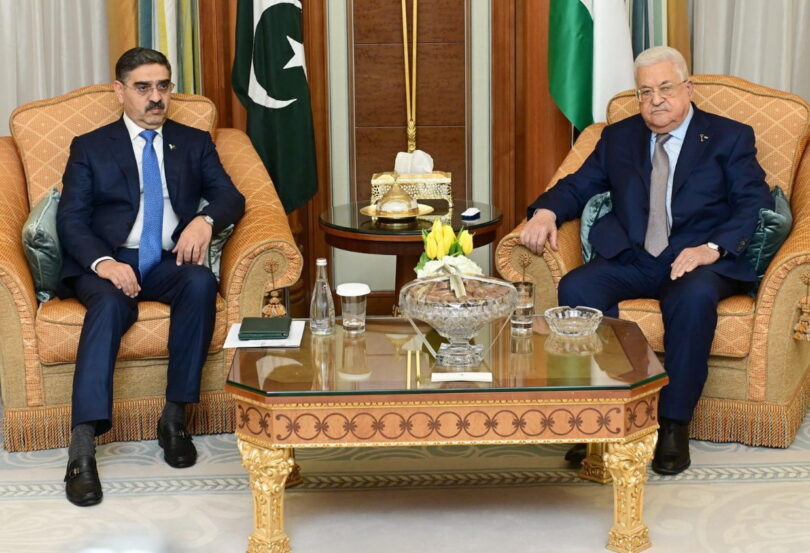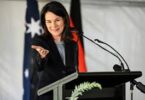F.P. Report
RIYADH: Caretaker Prime Minister Anwaar-ul Haq Kakar on Friday met with President of Palestine Mahmoud Abbas in Riyadh, Saudi Arabia.
The two leaders are attending the Extraordinary Summit of the OIC convened to discuss the dire situation in occupied Palestine resulting from the aggression of the Israeli occupation forces both in Gaza and the West Bank.
The Prime Minister conveyed unflinching solidarity of Pakistan with the Palestinian people. He strongly denounced the indiscriminate use of force by Israeli occupation forces and bombing of hospitals, refugee camps, schools and residential buildings, resulting in the loss of more than ten thousand precious lives and forced displacement of Palestinian families.
President Abbas appreciated Pakistan’s expression of solidarity in this difficult time and its principled stance on the right of self-determination of the Palestinian people. The two leaders emphasized the urgency of an unconditional ceasefire, end to the siege of Gaza and smooth delivery of vital humanitarian aid and medical assistance to the affected population. They underlined the need for international collaboration to stop Israel from further bloodshed.
Prime Minister Kakar and President Abbas noted the timeliness of the Extraordinary Summit of the OIC and appealed to the global community, particularly the United Nations and its pertinent organizations, to take resolute measures to uphold principles of justice and humanity and end the carnage of the Palestinian people.
Prime Minister Kakar underscored Pakistan’s unwavering commitment to a fair and enduring resolution of the Israeli-Palestinian conflict, founded on the two-state solution, leading to the establishment of a sovereign and viable Palestinian state with Al Quds Al Sharif as its capital, along borders that existed prior to 1967 enshrined in several OIC resolutions.
Meanwhile, the Caretaker Prime Minister Anwaar-ul-Haq Kakar has said that despite India’s lack of interest, Pakistan is focused to reap the benefits from the long-pending four-nation energy corridor, TAPI.
About the multibillion-dollar project involving Turkmenistan, Afghanistan, Pakistan, and India (TAPI), the prime minister said the corridor could prove as a source of cheap and sustainable supply of energy for the region. “On TAPI, there is a lot of enthusiasm from Turkmenistan, Afghanistan, and Pakistan. But if India chooses to remain out of the benefit of this whole arrangement, they still can do it,” Kakar said in an interview with Turkiye’s Anadolu news agency.
Kakar said, “With or without India, the Turkmen gas can be exploited for the economic benefit of this region, and we are very much focused on achieving that target.” The $7 billion project aims to bring natural gas from the Gylkynish and adjacent gas fields in Turkmenistan to Afghanistan, Pakistan, and India, the Anadolu reported.
The Asian Development Bank is facilitating and coordinating the project, which is proposed to lay a 56-inch diameter 1,680-kilometer (1,044-mile) pipeline with a design capacity of 33 billion cubic meters of natural gas per annum from Turkmenistan through Afghanistan and Pakistan up to Indo-Pak border. On relations with Turkiye, the prime minister called for enhanced coordination and cooperation, calling the bilateral relations “fabulous.”
He emphasized improvement in areas including trade, agriculture, and defence between Pakistan and Turkiye. Also, he said, developing connectivity corridors among Turkiye, Pakistan, and Iran could offer many opportunities to these nations and the whole region. Regarding the situation in Gaza, the prime minister warned of a “spillover effect” of the catastrophe, which he said could extend beyond the region.
Kakar called for an “immediate” cessation of the hostilities and incessant attacks of Israel and stressed the need for establishing a humanitarian corridor for an uninterrupted supply of food, medicines, and other essential items. He said Islamabad was looking forward to attending a forthcoming special session of the Organization of Islamic Cooperation, adding that the body should deliberate upon the situation, and come up with a “collective response.”
On Pakistan’s move to deport illegal foreigners, Kakar said the decision was meant to have a regulated movement across the borders. He mentioned that illegal immigration was never encouraged by any country in the world and Pakistan’s step was in the same context. About relations with India, he said the resolution of the Jammu and Kashmir dispute was vital for the normalization of ties between the two neighbours.
“Kashmir is an outstanding issue between India and Pakistan. Pakistan’s traditional position is that it should be resolved in accordance with the United Nations Security Council resolutions,” he said. “They (Kashmiris) have got every right to determine their future, their destiny … and Pakistan would always stand, diplomatically and politically, to support that stance,” he said.
Caretaker Prime Minister Anwaar-ul-Haq Kakar also said that an enhanced air, road and rail connectivity between Pakistan and Uzbekistan was vital to strengthen the bilateral trade and commercial ties, besides bringing the two peoples closer to each other.
The prime minister, in an interview with the Uzbek television channel Ozbekistan24 during his two-day visit to Tashkent to attend the 16th summit of the Economic Cooperation Organisation (ECO), said Pakistan would find a lot of inspiration to further develop bilateral relations.
“This will come with more connectivity. The connectivity through direct air, rail, and roads will be the answer to bringing the people closer,” he remarked. He said Pakistan considered Uzbekistan as one of the most important countries in the region as President Shavkat Mirziyoyev had taken multiple new initiatives in economic and connectivity terms.
He told the interviewer that during his multiple interactions, he had observed a lot of energy in President Mirziyoyev who was very focused and striving to translate his “clear” vision into tangible projects. Prime Minister Kakar said Uzbekistan and Pakistan had appointed their deputy prime minister and commerce minister respectively as focal persons to regularly meet and explore specifics for trade.
He said both countries could focus on trading the mutually required goods and the working groups would also identify such areas as pharmaceuticals. Uzbekistan could be also used as a transit route for further export to other countries, he added. “Both sides are exploring specifics. I am pretty sure that these specifics will bring in mutual benefits. The target of one billion dollar trade is short-term and it can go beyond that,” he remarked.
The prime minister appreciated the Uzbek president’s eagerness to execute the rail link between Uzbekistan, Afghanistan and Pakistan as he prudently approached all the players in the region and beyond. “We are currently working on carrying out the feasibility study from the World Bank. It shows his (Uzbek president) diplomatic and strategic skills for convincing everyone that the project will benefit everyone,” he added.
To a question, he said the Uzbek leadership was coming with renewed confidence and trying to acquire a deserved central position for Uzbekistan within the region. Prime Minister Kakar, who was on his first visit to Uzbekistan, said he was quite impressed with the modern infrastructure and well-groomed people in Tashkent showcasing the government’s priorities of investing in both infrastructure and human resources.
Citing the deep historical ties and commonalities of diction in Uzbek and Urdu languages, he said, “These shared roots will bring more closeness between the people, and develop into commercial and economic ties.” Mentioning the most popular Hadith collector Imam Bukhari, buried in Samarkand and revered across the Muslim world, the prime minister said while thinking about Uzbekistan, a scholarly and philosophical image came to one’s mind. (APP)







